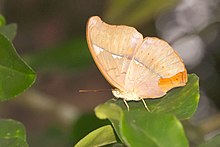| Tamil yeoman | |
|---|---|

| |
| Upperside | |

| |
| Underside | |
| Scientific classification | |
| Domain: | Eukaryota |
| Kingdom: | Animalia |
| Phylum: | Arthropoda |
| Class: | Insecta |
| Order: | Lepidoptera |
| Family: | Nymphalidae |
| Genus: | Cirrochroa |
| Species: | C. thais |
| Binomial name | |
| Cirrochroa thais (Fabricius, 1787) | |
Cirrochroa thais, also known as the Tamil yeoman, is a species of nymphalid butterfly found in forested areas of tropical Sri Lanka and India. It is the state insect of Tamil Nadu, an Indian state.
Description
For a key to the terms used, see Glossary of entomology terms.Wet-season form: Male. Upperside rich bright fulvous, somewhat deepest basally. Forewing with a slender dusky-lined discocellular streak, a transverse discal more or less prominent black sinuous interrupted line, its anterior portions from upper median dilated and bent inward; two submarginal sinuous lines, the inner dilating broadly inward to the costa, the outer partly merged into the black of outer border. Hindwing crossed by a more or less prominent black inner-discal slender broken line, anteriorly bordered by an outer costal quadrate white patch, followed by a medialrow of black spots, two submarginal sinuous Hues and a marginal even line. Underside. Ground-colour of various shades of reddish-ochreous washed with pale violaceous-grey; subbasal line dusky brown; transverse discal band white or violaceous-grey, dilated anteriorly, its inner-edge brown-lined and more or less deeply sinuous or broken up into dentate portions, its outer-edge being straight and unlined; followed by an outer-discal series of very obscure dusky dentate marks on the forewing, and a row of small black spots on hindwing, and submarginal lunular lines of the ground-colour bordered by violaceous-grey.
Female. Forewing more falcate at the apex. Upperside paler than in male, darker basally; markings similar. Underside olivescent greyish-ochreous or pale brownish-ochreous, washed with violaceous-grey; markings similar to male; the discal baud generally prominently edged on both sides by a dark purple-grey line; the discal row of black spots on hindwing very small.
Dry-season form: Male. Upperside slightly paler than in wet-season form; all the markings comparatively less prominent. Underside paler and a duller reddish-ochreous, the subbasal and outer markings obscure, the discal band on both wings entire throughout its course, and either of the same shade as the ground-colour or white, its inner edge being very slightly sinuous, and not broken up into dentate portions as in wet-season form.
Female. Upperside also slightly paler than in wet-season form, and the markings less prominent. Underside paler greyish-ochreous than in wet-season form; subbasal and outer markings similar; the discal baud entire, as in male, white.
— Frederic Moore, Lepidoptera Indica. Vol. IV
Wingspan 60–75 mm.
Gallery
References
- ^ R.K., Varshney; Smetacek, Peter (2015). A Synoptic Catalogue of the Butterflies of India. New Delhi: Butterfly Research Centre, Bhimtal & Indinov Publishing, New Delhi. p. 206. doi:10.13140/RG.2.1.3966.2164. ISBN 978-81-929826-4-9.
- "Cirrochroa thais - Tamil Yeoman - Butterflies of India".
- "Cirrochroa Doubleday, [1847]" at Markku Savela's Lepidoptera and Some Other Life Forms
- ^
 One or more of the preceding sentences incorporates text from this source, which is in the public domain: Bingham, Charles Thomas (1905). Fauna of British India. Butterflies Vol. 1. pp. 421–423.
One or more of the preceding sentences incorporates text from this source, which is in the public domain: Bingham, Charles Thomas (1905). Fauna of British India. Butterflies Vol. 1. pp. 421–423.
- ^
 One or more of the preceding sentences incorporates text from this source, which is in the public domain: Moore, Frederic (1899–1900). Lepidoptera Indica. Vol. IV. Vol. 4. London: Lovell Reeve and Co. pp. 218–220.
One or more of the preceding sentences incorporates text from this source, which is in the public domain: Moore, Frederic (1899–1900). Lepidoptera Indica. Vol. IV. Vol. 4. London: Lovell Reeve and Co. pp. 218–220.
- Kumar, K Sambath (30 June 2019). "Tamil yeoman declared Tamil Nadu's state butterfly". The Times of India. Retrieved 1 July 2019.
- Shrikumar, A. (2019-07-25). "On how Tamil Yeoman became the State butterfly of Tamil Nadu". The Hindu. ISSN 0971-751X. Retrieved 2019-08-02.
| Taxon identifiers | |
|---|---|
| Cirrochroa thais | |
This Heliconiinae article is a stub. You can help Misplaced Pages by expanding it. |




